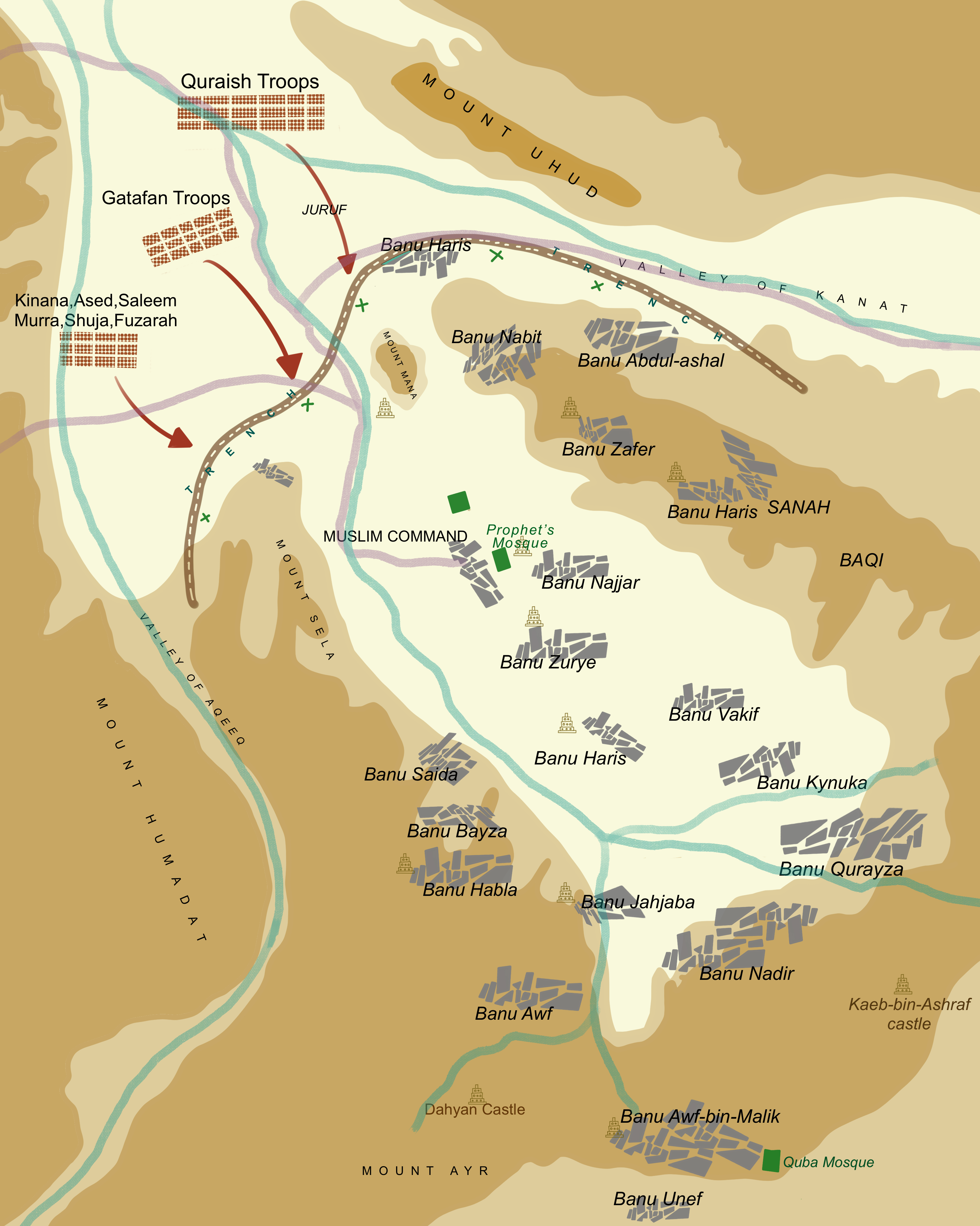
Zubayr ibn al-Awwam
Al-Zubayr ibn al-Awwam ibn Khuwaylid al-Asadi (Arabic: الزُّبَيْر بْن الْعَوَّام بْن خُوَيْلِد الأَسَدِيّ, romanized: al-Zubayr ibn al-ʿAwwām ibn Khuwaylid al-ʾAsadī; c. 594–656) was an Arab Muslim commander in the service of the Islamic prophet Muhammad and the caliphs Abu Bakr (r. 632–634) and Umar (r. 634–644) who played a leading role in the Ridda wars against rebel tribes in Arabia in 632–633 and later participated in early Muslim conquests of Sasanid Persia in 633–634, Byzantine Syria in 634–638, and the Exarchate of Africa in 639–643.
Al-Zubayr ibn al-Awwam
الزُّبَيْر بْن الْعَوَّام
الزُّبَيْر بْن الْعَوَّام
Hawari Rasul Allah ('Disciple of Messenger of God')
Abu Abd Allah
c. 656 (aged 61–62)
Basra, Rashidun Caliphate
- Rashidun army
- Khatiba al Khudra e were coined by Tabari[1]
- Jund Filastin (Palestine division)[2]
- Jund al-Misr (Egypt division)[3][4][Notes 1]
624-656
- Field commander of Battle of Badr, Conquest of Mecca,[4] and Muslim conquest of Egypt[4]
- Rashidun cavalry commander in Battle of Hunayn[7] and conquest of al-Bahnasa[8]
- Commander of the Basra army of Aisha †
- Battles under Muhammad
- Battle of Badr
- Battle of Uhud
- Battle of Hamra al-Asad[9]
- Invasion of Banu Qaynuqa[9]
- Invasion of Banu Nadir[9]
- Expedition of Badr al-Maw'id[9]
- Expedition of Dhat al-Riqa[9]
- Expedition of Dumat al-Jandal[9]
- Expedition of al-Muraysi'[9]
- Battle of the Trench[4]
- Invasion of Banu Qurayza[9]
- Invasion of Banu Lahyan[9]
- Expedition of Dhu Qarad[9]
- Conquest of Fadak[9]
- Battle of Khaybar
- Third Expedition of Wadi al Qura[9]
- Conquest of Mecca
- Hunayn & Awtas
- Siege of Ta'if
- Battle of Tabuk
- Apostate wars
- Muslim conquest of the Levant
- Capture of Amman
- Battle of Yarmouk
- Capture of Ayla[10]
- Muslim conquest of Persia
- Muslim conquest of Egypt
- Capture of Faiyum
- Battle of Heliopolis
- Siege of Heliopolis
- Siege of Babylon Fortress
- Muslim conquest of Sudan
- Muslim conquest of the Maghreb
- First caliphate civil war
- Asma bint Abi Bakr
- Umm Kulthum bint Uqba
- Atiqa bint Zayd
- Rabab bint Unayf
- Tumadir bint al-Asbagh
Al-Awwam ibn Khuwaylid (father)
Safiyya bint Abd al-Muttalib (mother)
- First chain Narrator of Hadith
Mufti of the Rashidun Caliphate - Majlis-ash-Shura advisory council member
Registrar of zakat and charity
An early convert to Islam, Zubayr was a commander in the Battle of Badr in 624, in which the latter was instrumental in defeating the opponent forces of the Quraysh. He participated in almost all of the early Muslim battles and expeditions under Muhammad. In the Battle of the Trench, due to his military service, Muhammad bestowed the title Hawari Rasul Allah ('Disciple of Messenger of God') upon him. After Muhammad's demise, Zubayr was appointed as a commander, in the Ridda Wars, by caliph Abu Bakr. He was involved in the defense of Medina and Battle of Yamama. During Umar's caliphate, Zubayr served in the Muslim conquests of Egypt, Levant, Persia, Sudan, and Tripolitania.
After Umar's assassination, Zubayr became an important political figure of the caliphate, being the chief advisor of the Shura that elected the third caliph Uthman. During the latter's caliphate, Zubayr advised the caliph in political and religious issues.[13] After Uthman was assassinated, Zubayr pledged allegiance to the fourth caliph Ali, though later withdrew allegiance, after Ali refused to avenge Uthman's death. Zubayr's forces engaged with Ali's forces in the Battle of the Camel in December 656. In the aftermath, while Zubayr was prostrating in prayer, he was killed by Amr ibn Jurmuz.
Zubayr is generally considered by historians to be one of early Islam's most accomplished commanders. The Sunni Islamic tradition credits Zubayr as being promised paradise. The Shia Islamic tradition views Zubayr negatively. The general's descendants, known as the Zubayrids, are found worldwide.